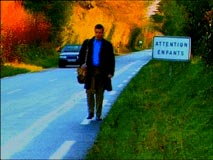 In Praise of Love (Eloge de L’Amour) (2001, Dir. Jean-Luc Godard):
In Praise of Love (Eloge de L’Amour) (2001, Dir. Jean-Luc Godard):
This is not a film review. At least, not one of my typical film reviews.
Modern time, today time, is split into fragments, pieces rather than compilations. Some point to MTV (80s MTV, that is); I refer to mp3s — digestible, bite-sized nuggets ripped away from original sources and contexts. Not that this is new. Think rock ‘n roll singles from the 50s, or even mini-concertos in previous centuries. There is something comforting about the miniature, the self-contained, something easily bordered and graspable.
Me, I’m old school. I like curling up with a long read, something that takes physical time to absorb. Some of the happiest moments of my life have occurred at the end of a journey — the closing of the novel’s well-bent spine, the conclusion of a long-running television series, the moment of departure after a few years spent in a foreign land. I appreciate the fractured approach (my recent fiction is nothing but fractured), but like a stubborn codger I treasure something wrought, constructed, built to last, meant to be taken in its entirety.
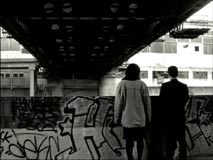 And then I happen upon something like In Praise of Love. It’s not a great film; I’m not even sure it’s a good film. But it has stuck with me. I saw it for the first time three years ago, at the San Francisco International Film Festival, with a captive (in both senses of the word) audience. Tonight, I saw it for the first time since then. But that’s not accurate — tonight is the first time I’ve seen it from beginning to end since then. In the interim, I’ve seen it plenty, but only scattered moments, glimpses of scenes, bits of dialogue and visuals and music. Two moments in particular — more on this in a bit.
And then I happen upon something like In Praise of Love. It’s not a great film; I’m not even sure it’s a good film. But it has stuck with me. I saw it for the first time three years ago, at the San Francisco International Film Festival, with a captive (in both senses of the word) audience. Tonight, I saw it for the first time since then. But that’s not accurate — tonight is the first time I’ve seen it from beginning to end since then. In the interim, I’ve seen it plenty, but only scattered moments, glimpses of scenes, bits of dialogue and visuals and music. Two moments in particular — more on this in a bit.
I’m beginning to learn that what captures my imagination the most are the random bits: isolated dialogue that can be accepted as epigrams, or shots or incidents that suggest whole characters and stories, even when they are merely glanced at, hinted at. If you’re looking for cogent commentaries on In Praise of Love, see Charles Taylor’s dismantling of it, or Jeremy Heilman’s valentine. Like I said, this is not a review, but a reflection.
I have only seen two other Godard films: Alphaville and Breathless, both groundbreaking for their time, both idiosyncratic to this day, wryly puncturing themselves even as they run wild with noir and science fiction tropes. Even then, Godard regarded his characters and the whole storytelling vibe with suspicion; we laugh at as well as with Jean-Paul Belmondo’s Bogey poses in Breathless, and chuckle at the thought of bug-eyed, gravel-voiced Eddie Constantine tearing down an entire computer-controlled society in Alphaville. Not surprisingly, in his curmudgeonly old age, Godard has all but given up on characters entirely. In Praise of Love is about ideas, semantics, the “four stages of love” (meeting, passion, separation, and reconciliation, in case you’re interested), the death of History, how love and “the State” cannot coexist, the cultural fascism of Steven Spielberg and America, so on and so forth. At its core, it’s an almost-love story about an artist named Edgar (Bruno Putzulu) desperate to finish some kind of project about Love, and an outspoken, suicidal woman named Elle (Cecile Camp) who he wants to recruit for the project. It’s about all these things (and Heaven knows it taxes the viewer’s patience as it gets around to them), but for me, it’s about none of them.
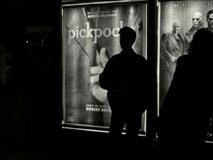 Strangely enough, it’s isolated moments, the ones freed from what sliver of story there is or Godard’s despairing worldview, the ones that are specific fusions of images and sounds (or if you like, pure cinema), that stay with me. This was a startling realization for me, because I am usually all about the story, the plot, the movement. Without story, what is there? And yet, here I am rapt with the stasis of it all, how the camera is content to sit and observe and record striking juxtapositions of people and places. The cinematography is gorgeous; that alone is inspirational. The first hour of the film is shot on black-and-white film in a wintry Paris, littered with casual shots of boulevards at night, homeless folks asleep on benches or cuddling with each other in sleeping bags, crystalline rooms where Edgar auditions actors. One can’t miss the point when our protagonist stands before a movie house, a poster of Bresson’s Pickpocket and a poster for The Matrix butting heads, but it works, because the image is haunting in its matter-of-factness.
Strangely enough, it’s isolated moments, the ones freed from what sliver of story there is or Godard’s despairing worldview, the ones that are specific fusions of images and sounds (or if you like, pure cinema), that stay with me. This was a startling realization for me, because I am usually all about the story, the plot, the movement. Without story, what is there? And yet, here I am rapt with the stasis of it all, how the camera is content to sit and observe and record striking juxtapositions of people and places. The cinematography is gorgeous; that alone is inspirational. The first hour of the film is shot on black-and-white film in a wintry Paris, littered with casual shots of boulevards at night, homeless folks asleep on benches or cuddling with each other in sleeping bags, crystalline rooms where Edgar auditions actors. One can’t miss the point when our protagonist stands before a movie house, a poster of Bresson’s Pickpocket and a poster for The Matrix butting heads, but it works, because the image is haunting in its matter-of-factness.
The dialogue ranges from the provocative (“Whenever I think of something, I’m always thinking of something else” — a line that I will probably steal someday, or “every thought should recall the debris of smile”) to the banal (“The question is not how do we go on, but do we have the right?”), with a success ratio of about 20 percent. No matter, there is nothing truly annoying about it, apart from a few scattered potshots at America, the land without History (the heroine gives Hollywood producers the third degree about who exactly is an “American” or of “The United States” — I’m all for deflating American pomposity, but this is the stuff of social studies class arguments). Regardless, I can appreciate a film that attempts to throw the Big Ideas at you, even if most of them are moldy. If nothing else, they impel me to think: Well, maybe there’s a better, or more up-to-date, way of thinking about this.
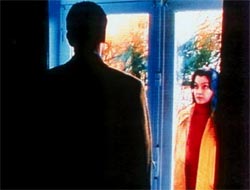 The second half of the film, which takes place in Brittany, is presented in overwhelming color — ironic, since it’s supposed to take place two years before the first half. To be more specific, it’s shot in oversaturated digital video, and to this day I still think it’s the most remarkable use of the medium I’ve seen in a major film. The images leap, but they also have weight, character. An actual story emerges (Spielberg’s lawyers buying the rights to a French Resistance couple’s story, and threatening to sugarcoat it as a Juliette Binoche prestige flick), but even this is tangential to the isolated moments. Like the one where Edgar and Elle meet for the first time — an exquisitely framed shot. Or the increasingly frequent images of waves crashing against the shores, or those collages in which the characters seem to be swamped by those very waves, as history and meaning crash, converge, and drown. Which brings me to my two favorite moments of the film.
The second half of the film, which takes place in Brittany, is presented in overwhelming color — ironic, since it’s supposed to take place two years before the first half. To be more specific, it’s shot in oversaturated digital video, and to this day I still think it’s the most remarkable use of the medium I’ve seen in a major film. The images leap, but they also have weight, character. An actual story emerges (Spielberg’s lawyers buying the rights to a French Resistance couple’s story, and threatening to sugarcoat it as a Juliette Binoche prestige flick), but even this is tangential to the isolated moments. Like the one where Edgar and Elle meet for the first time — an exquisitely framed shot. Or the increasingly frequent images of waves crashing against the shores, or those collages in which the characters seem to be swamped by those very waves, as history and meaning crash, converge, and drown. Which brings me to my two favorite moments of the film.
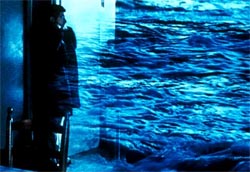 If you happen to rent or buy this film, skip forward to 1:25:50 (it’s the section appropriately named “Red Orchestra” (L’Orchestre Rouge) in the intertitles). At this point, the characters have been talking about impermanence, acceptance, even religion. But all this talk does not compare to what follows: a long, wordless, sustained shot of waves lapping against the shore at night, the town’s lights like slivers as they run across them, the water moving back and forth, the soundtrack reverberating with the melancholy warmth of multitracked cellos (a few days ago I finally tracked down the artist and the title of the piece: David Darling,”Song for TKJD,” from the album Epigraphs). For me it captures a melange of emotions: nostalgia, loss, permanence and impermance sliding together, and beauty above all.
If you happen to rent or buy this film, skip forward to 1:25:50 (it’s the section appropriately named “Red Orchestra” (L’Orchestre Rouge) in the intertitles). At this point, the characters have been talking about impermanence, acceptance, even religion. But all this talk does not compare to what follows: a long, wordless, sustained shot of waves lapping against the shore at night, the town’s lights like slivers as they run across them, the water moving back and forth, the soundtrack reverberating with the melancholy warmth of multitracked cellos (a few days ago I finally tracked down the artist and the title of the piece: David Darling,”Song for TKJD,” from the album Epigraphs). For me it captures a melange of emotions: nostalgia, loss, permanence and impermance sliding together, and beauty above all.
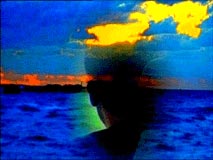 About eight minutes later, the second remarkable passage: Elle is driving Edgar to the airport, at night, in the rain. We know from earlier in the film that Edgar’s project will never be completed, that Elle will commit suicide two years later, that this may be the last restful moment the two of them share. None of this is telegraphed or milked. Instead we see the view out the front windshield, cars passing in the night like figments of thought, rain spattering on the windows, David Darling’s piece coloring it all once again, but this time with a more ethereal effect. For me, it recalls every dark night on every rainy road I have ever experienced, and the unexpected muted joys at such moments. The airless discussions that clog In Praise of Love don’t stand a chance against overpowering cinema such as this, but I come not to bury the film and how its polemics fall short, or even engage it on the level that it demands to be engaged (Jean-Luc may not be too pleased about that). Instead, I come to praise these bursts of light and shadow, the particular mix of electrons, this art seemingly conjured from thin air — how elements merge unexpectedly to create fragments of time that stir, and suggest, and communicate. For would-be artists like me, there’s nothing more invigorating.
About eight minutes later, the second remarkable passage: Elle is driving Edgar to the airport, at night, in the rain. We know from earlier in the film that Edgar’s project will never be completed, that Elle will commit suicide two years later, that this may be the last restful moment the two of them share. None of this is telegraphed or milked. Instead we see the view out the front windshield, cars passing in the night like figments of thought, rain spattering on the windows, David Darling’s piece coloring it all once again, but this time with a more ethereal effect. For me, it recalls every dark night on every rainy road I have ever experienced, and the unexpected muted joys at such moments. The airless discussions that clog In Praise of Love don’t stand a chance against overpowering cinema such as this, but I come not to bury the film and how its polemics fall short, or even engage it on the level that it demands to be engaged (Jean-Luc may not be too pleased about that). Instead, I come to praise these bursts of light and shadow, the particular mix of electrons, this art seemingly conjured from thin air — how elements merge unexpectedly to create fragments of time that stir, and suggest, and communicate. For would-be artists like me, there’s nothing more invigorating.





